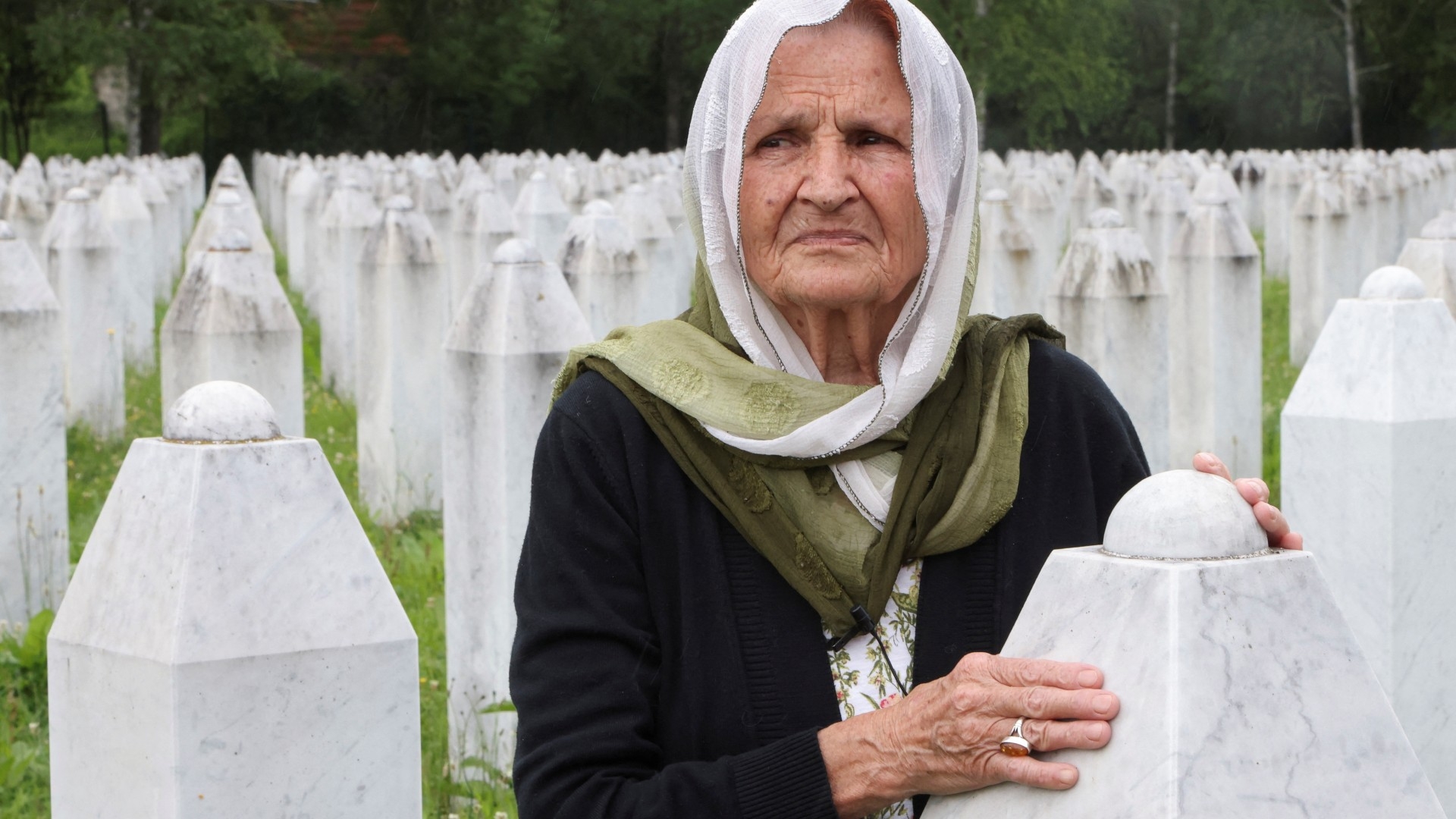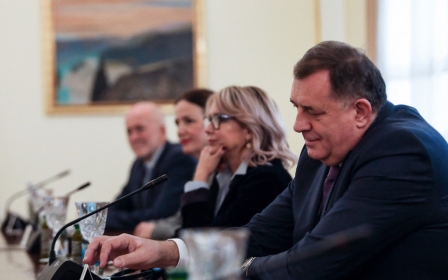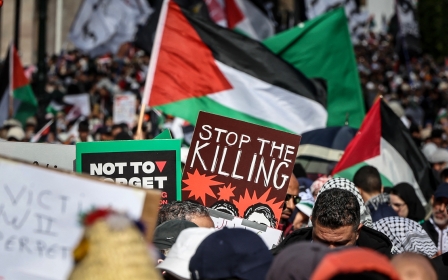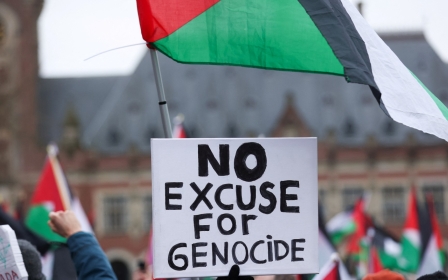War on Gaza: Israel's onslaught recalls horrors of Bosnian genocide

It was clear from the outset: the annihilation of Gaza unleashed by Israel, nominally in response to Hamas’s atrocities on 7 October, was genocidal in its intent, conduct and outcomes.
To me, the key elements of genocide were apparent just weeks into Israel’s destructive campaign. Most international law experts I know were, at the time, still reluctant to qualify Israel’s actions as being in any way outside of its right to self-defence.
Today, most of them have no such doubts. South Africa and a number of other countries have made a devastating case before the International Court of Justice that Israel’s crimes indeed constitute genocide, while top Israeli officials are facing possible prosecution at the International Criminal Court.
My own assessments of the situation were informed not only by more than 25 years of experience working in various contexts where genocidal violence was suffered, but most importantly, by the fate of my own people.
As Bosnians, we also suffered and survived a campaign that sought to exterminate us from lands claimed by others.
New MEE newsletter: Jerusalem Dispatch
Sign up to get the latest insights and analysis on Israel-Palestine, alongside Turkey Unpacked and other MEE newsletters
Clearly, the contexts in which these crimes have been committed are different. The conflicts have different historical and root causes, but there are many commonalities, especially when it comes to elements of the crimes committed in both Bosnia and Gaza.
From the outset, the same arguments that were used to justify inflicting violence on Bosnians were used against Palestinians in Gaza. Palestinians ceased to be humans; children ceased to be children; they all became “Hamas”.
Mass graves
At the very least, Palestinians were regarded as a security threat to be removed. At the worst - as clearly articulated by the likes of Israel’s prime minister and defence minister - they were Amalek, human animals for whom there would be no mercy.
As the world watched, thousands upon thousands of civilians were indiscriminately killed and maimed by high-tech, precise weaponry, largely supplied by the United States and other western countries. Entire city blocks were bombed to dust with people still inside; mass graves were unearthed under the rubble of hospitals; babies died of starvation under merciless siege.
Follow Middle East Eye's live coverage of the Israel-Palestine war
Images of scores of Palestinian men, made to strip down and kneel at gunpoint with their heads down, brought back memories of the Omarska and Keraterm concentration camps, where men from my hometown of Prijedor were taken to be tortured and killed during “interrogations” after being accused by Bosnian Serb forces of being “jihadists, terrorists, mujahideen”.
Videos of gleeful celebrations of mass atrocities filmed by Israeli soldiers in Palestinian homes they were about to demolish, blended on our social media timelines with those of Israeli leaders justifying the carnage in Gaza by arguing that there were no innocents; that Palestinians voted Hamas into power, so they were all terrorists - if not today, then tomorrow.
If there is nothing else we can do, Bosnians and all victims of genocide everywhere must, after all we suffered, speak up for the victims in Palestine
We Bosnians know this language all too well.
Since those early days, parallels between the Bosnian genocide and Gaza have sharpened and become more obvious. Terrorising civilians into submission; creating “safe zones” that later become killing fields; attacking hospitals, schools and humanitarian convoys - we saw it all during the 1990s.
In Srebrenica, which was under siege during the Bosnian War, Bosnian Serbs justified committing genocide by claiming revenge for attacks by the Bosnian army from the enclave. Such gaslighting and genocide denial continue to this day.
Radovan Karadzic, the Bosnian Serb leader convicted of genocide and an icon of the Islamophobic far right in the West, never missed an opportunity to portray his genocidal undertaking as some sort of a holy war, defending western civilisation from “Islamist hordes”, a modern iteration of Ottoman Turks.
But the quote about “a war that is intended, really, truly, to save western civilisation … [from] an empire of evil” does not belong to Karadzic, but to Isaac Herzog, the president of Israel. Alarmingly, this message has a significant and powerful audience in the West today, as evidenced by how protests against Israel’s crimes are being dealt with, from the streets of German cities to campuses of American universities.
Permanent harm
The parallels between Gaza and the Bosnian genocide are not exhausted in the analysis of dehumanisation, manufacturing of consent, elements of crime and the methods of their implementation. They also include motives: inflicting such harm on the targeted community that it can never recover, enabling the permanent takeover of occupied territory.
In determining that genocide occurred in Srebrenica, judges of the International Criminal Tribunal for the Former Yugoslavia (ICTY) ruled that “Bosnian Serb forces were aware, when they embarked on this genocidal venture, that the harm they caused would continue to plague the Bosnian Muslims”.
Israeli political leaders, and the large section of the public that supports their actions in Gaza, do not even attempt to conceal the same intent to ensure that the harm suffered by Palestinians in Gaza is such that they cannot recover from it in the foreseeable future, if ever.
The level of destruction - the wounds and traumas inflicted on all Gazans - testify to this. The ominous title of a Carnegie Endowment report captures it best: “There might be no day after in Gaza.” No genocide is perpetrated without the ultimate goal of removing a group permanently from a certain area in all of its manifestations - political, economic, cultural and, ultimately, physical and biological.
In Bosnia, Karadzic did not succeed in his undertaking, at least not entirely. Bosnian Muslim children are still born in Srebrenica. Victims of genocide are commemorated at the Srebrenica Memorial Center, which guards their memories and the truth about the Srebrenica genocide. But the area’s Bosnian Muslim population is only a fraction of what it was before the genocide. Time will tell if it will ever recover, or if Karadzic’s poisonous legacy will prevail.
In capturing the essence of what distinguishes genocide from other crimes, ICTY judges have said that “those who devise and implement genocide seek to deprive humanity of the manifold richness its nationalities, races, ethnicities and religions provide. This is a crime against all of humankind, its harm being felt not only by the group targeted for destruction, but by all of humanity.”
It took this humanity almost 30 years to acknowledge the victims of the Srebrenica genocide in a UN resolution adopted in May. As I write this, the same humanity is incapable of stopping Israel’s genocidal campaign - let alone of acknowledging its Palestinian victims, addressing the harm inflicted upon them, and bringing perpetrators to justice.
This makes solidarity among victims even more crucial. If there is nothing else we can do, Bosnians and all victims of genocide everywhere must, after all we suffered, speak up for the victims in Palestine. We are the humanity that the ICTY judges spoke about.
The views expressed in this article belong to the author and do not necessarily reflect the editorial policy of Middle East Eye.
Middle East Eye delivers independent and unrivalled coverage and analysis of the Middle East, North Africa and beyond. To learn more about republishing this content and the associated fees, please fill out this form. More about MEE can be found here.






